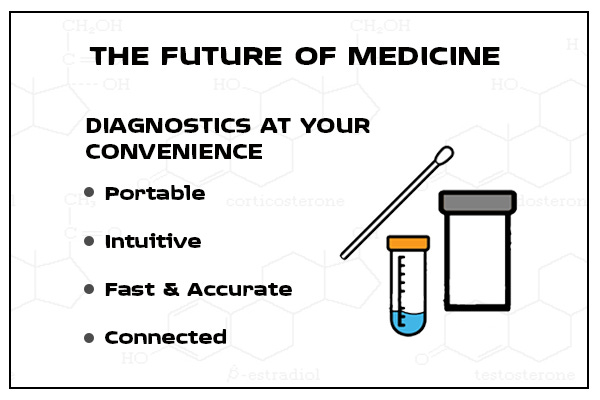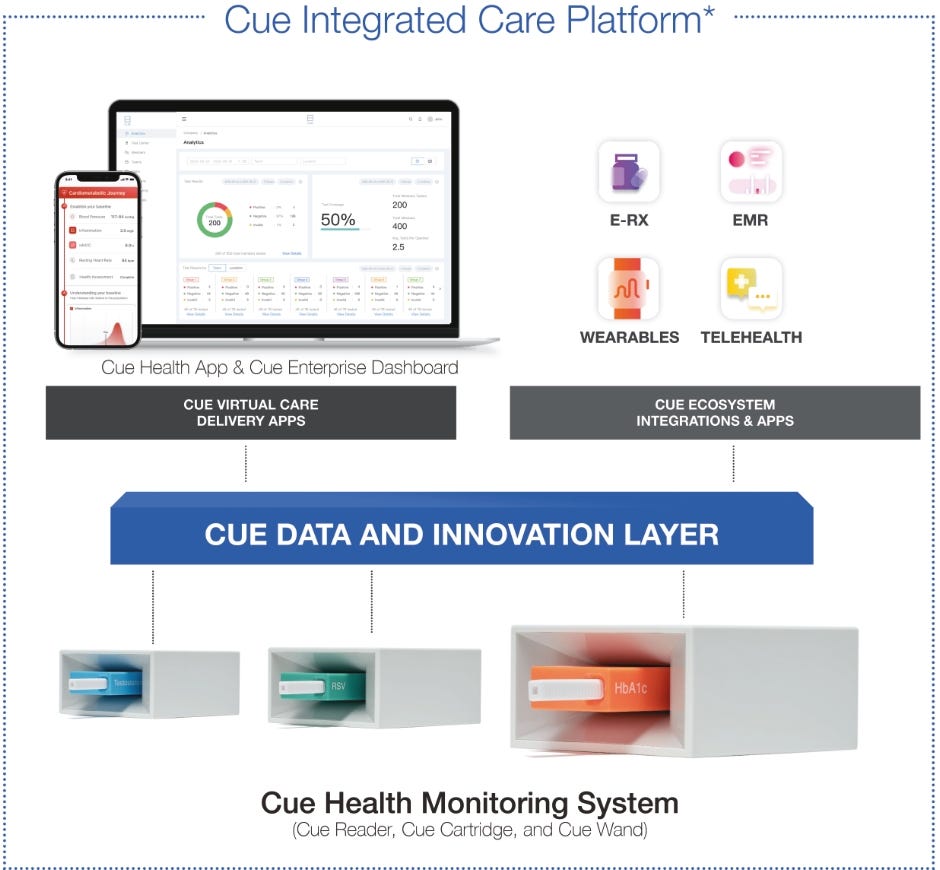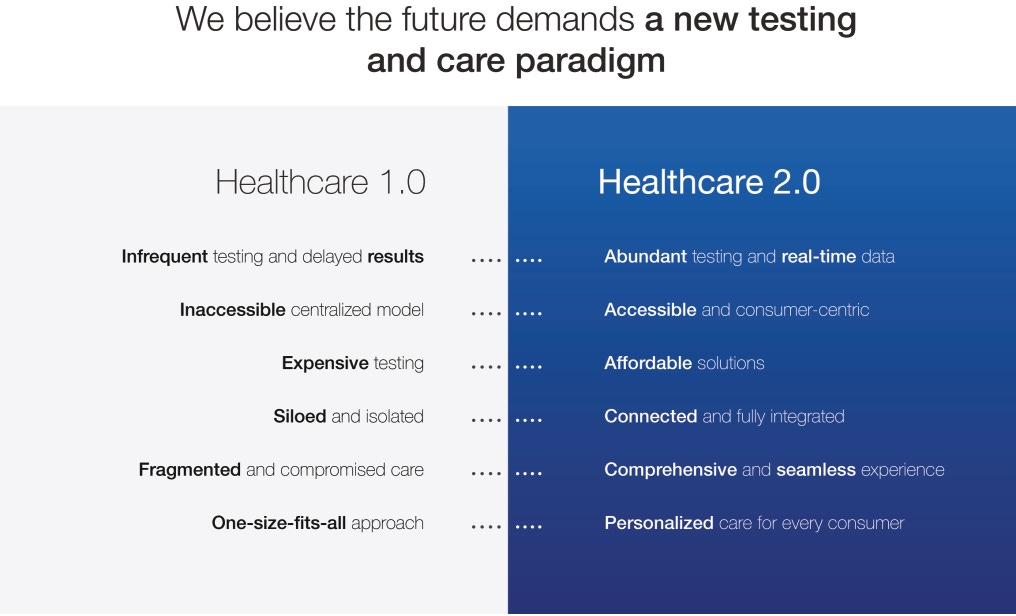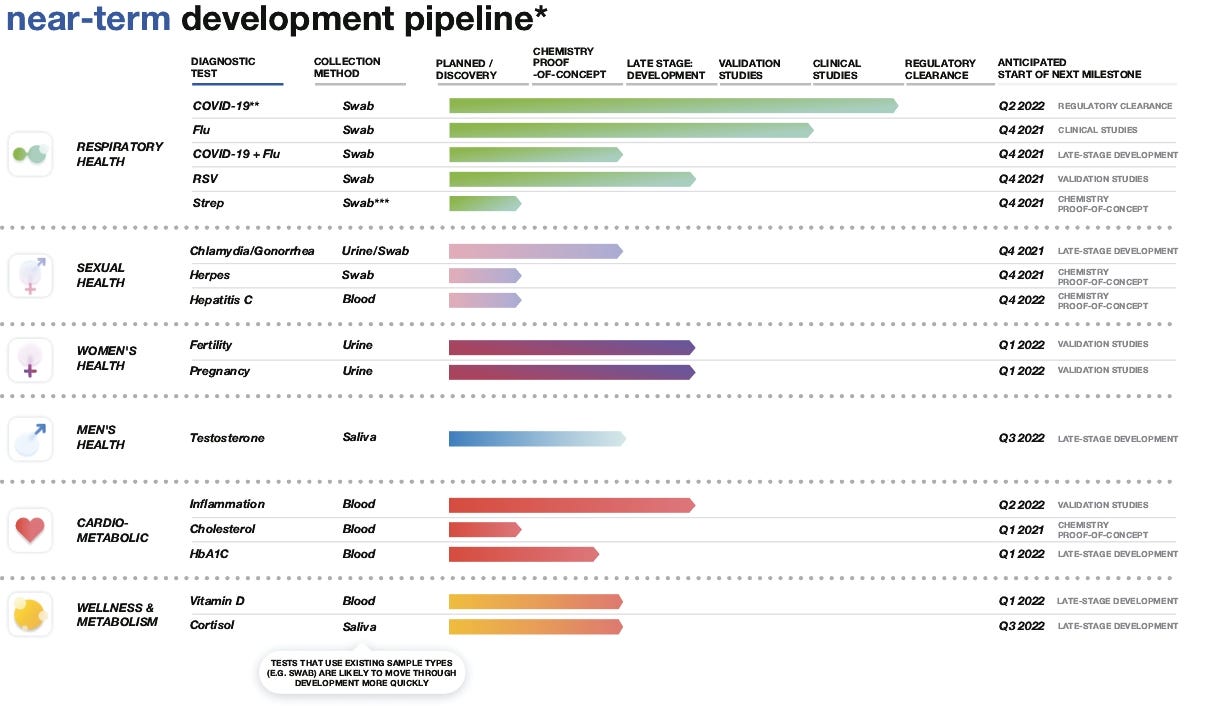[Part 1] The Search Engine for the Body
Here's how a small biotech firm born out a crisis wants to change the world
Hey all—Robin here, and for the first time ever I won’t be talking about crypto. I will be zeroing in on an IPO today as I’ve promised prior to this post.
Our world is rapidly changing as we enter the exponential age—a world where several game changing technologies converge and intertwine in ways that we simply can’t imagine.
My job is to make sure that you can understand them and ponder this information when making choices.
Today, we’re going to be talking about Cue Health—a company you’ve probably never heard of unless you really closely read my tweets. I mentioned them pre-ipo in a joke for draconian Covid measures where you needed to carry and do a Covid test to go anywhere on the spot.
Now, my joke is becoming an investable opportunity and this is the sheer magic of the Jungle.
Cue Health is a small diagnostics company that rose up during the Covid-19 pandemic to produce the most portable, quick, and accurate Covid test that is used by some of world’s top institutions like the American Department of Defense, the NBA, the Mayo Clinic, and even Google.
However, they want even more—they want to give easy, cheap, and connected tests to everyone in the world so they can better understand their bodies. Will they win?
I don’t know, but I think the opportunity is too great to pass up even if the probable outcome is failure.
Let’s find out how they got to this point.
Leonardo DiCaprio, the search engine of the body, an Obama advisor, and the Swine Flu
It was 2010 and the Swine Flu was raging across America with Covid, but the Swine Flu was nowhere near as world changing as Covid. Ayub Khattak and Clint Sever had an idea to make easy tests for the Swine Flu pandemic.
Fast forward to 2014 and Cue has now closed their Series A from Leonardo DiCaprio, Shervin Pishevar (Virgin Hyperloop), Marc Benioff (Salesforce), Jim Messina (Obama advisor and investor in Blockchain.com), ACME Capital, and many others.
Shervin Pishevar remarked that Cue Health was set to be “the search engine of the body.”
He was wrong that it would release in one year—in the 5 years that elapsed since that point because Cue didn’t produce anything during that time as they streamlined their manufacturing process and focused on R&D.
However, an event was going to roll around in November of 2019 that would fundamentally change the world.
Covid-19, America’s DARPA but for biotech, and Profitability
We don’t fully know the origins of Covid-19, but the more compelling evidence indicates a lab leak in November of 2019 that later spread around the world and is now mutating in various forms. We will probably never know the exact origins of the virus.
On March 31st 2020, America’s Biomedical Advanced Research and Development Authority (BARDA) awarded Cue Health $13 million in a government grant to fund a rapid, portable, point-of-care Covid-19 test. You can think of something like DARPA but for biotechnology intended to protect Americans from any natural or man-made biological threat.
With this funding, Cue set out to create the most rapid and portable Covid test in the world that can nearly fit in your pocket.
They ended up getting EUA approval by the FDA in June of 2020. So no, this is not a Theranos, but their other tests could be put in the game of biotech—that’s just a risk you have to take.
Furthermore, Cue’s most recently obtained approval for over-the-counter and home use. This is unheard in the Covid realm, and the only other firm to obtain such an approval is Lucira Health.
Fast forward to the fall of 2020 and Cue has now gotten the largest American Department of Defense and Health and Humans Services grant that has ever been issued. A whopping $481 million to amp up Covid-19 testing production kits, expand manufacturing, and ensure that the DoD is supplied with enough Covid tests to last a lifetime.
The fact of the matter is that Covid-19 is endemic. No amount of vaccines, therapies, pills, and inhalant vaccines will ever change that reality. Every country in the world will need rapid and accurate diagnostics testing, and Cue is by far the most compelling entity for this.
India, the European Union, and the syrup loving frens in Canada have all given EUA equivalent authorizations for Cue’s rapid Covid-19 test.
What else does Cue have up their sleeve?
The main thing that Cue has right now is the ability to work with is the Cue Integrated Platform which seeks to combine e-rx (online pharmacies), EMR (electronic medical works), wearables (WHOOP and other Smart Watches—I suspect Cue has an upcoming partnership with WHOOP based off their Twitter likes), and Telehealth (virtual doctor’s visits). Cue seeks to combine all of those together to create what they call Healthcare 2.0.
What’s Healthcare 2.0 and how does it relate to Cue?
The rise of Healthcare 2.0 has been in the works with increasing digitization in healthcare, and the topic deserves an entire Substack blog covering individual companies and stocks.
Regardless, Cue is trying to zero in on the diagnostics market which comprises of a variety of tests. They make up a whopping 70% of all healthcare decisions.
Healthcare 1.0 (Current world in 2021):
Centralized Care that is limited to: hospitals, doctor’s offices, and urgent care clinics.
The current health infrastructure is slow and unable to adapt to changing technologies.
Expensive and slow testing that takes two weeks to have samples be analyzed.
One size fits all.
Diagnostics in it of itself is largely broken and is not up to date for the digital age. While Cue currently only has their SARS-CoV-2 test under EUA authorization, they seek to permanently change diagnostics.
The science could be years out and this presents massive risks. However, Cue’s current Covid test and reliance on the United States government and Covid-19 remaining endemic is enough to justify the massive risk with the massive results and potential for growth.
Healthcare 2.0:
Abundant and cheap testing
The convergence of wearables and healthcare to give patients realtime health data.
Consumer focused healthcare.
Individualized model.
Decentralized.
Virtual and physical visits.
The regular use of Artificial Intelligence in healthcare (ex: Babylon)
The great thing about Healthcare 2.0 is that it’s much like Web 3.0—it’s the convergence of many different things at the same time.
That’s all for this post, please tune in for Part 2 where I’ll cover the financials and pros and cons of Cue.








Funny part is that several countries here in Europe actually had a period where you had to carry a quick test for Covid to use certain services.
Decentralizing healthcare seems to be the way things are going as relatively healthy people are interested in their health. In previous generations, health was only something to think about when you were sick. Now it's something to be optimized.